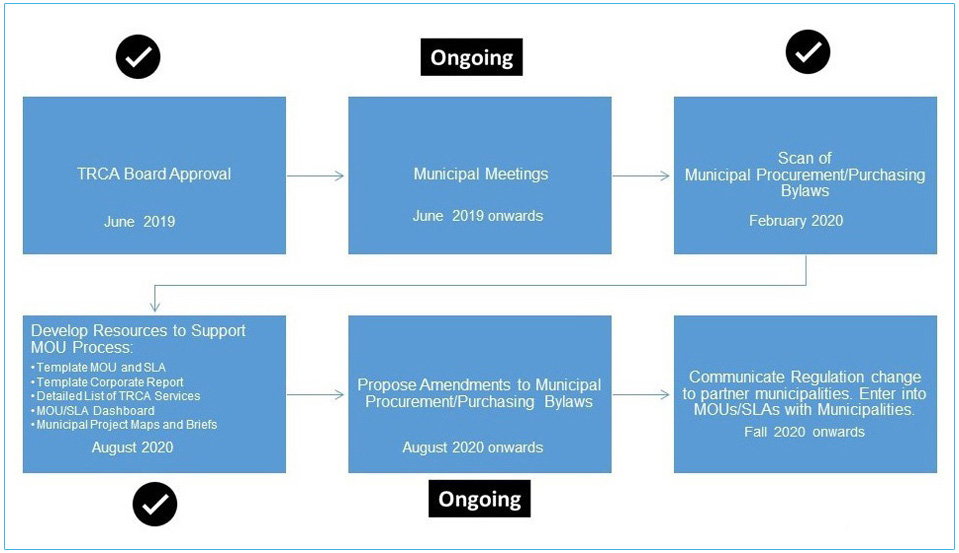Update on Municipal Memorandums of Understanding and Service Level Agreements
September 30, 2020
 Many of you have heard about recent amendments to the Conservation Authorities Act (CA Act) and have wondered what it might mean for your projects, programs and work. This past Friday, our Board of Directors once again endorsed our most recent update on continued efforts to advance Memorandums of Understanding (MOUs) and Service Level Agreements (SLAs) with our municipal partners.
Many of you have heard about recent amendments to the Conservation Authorities Act (CA Act) and have wondered what it might mean for your projects, programs and work. This past Friday, our Board of Directors once again endorsed our most recent update on continued efforts to advance Memorandums of Understanding (MOUs) and Service Level Agreements (SLAs) with our municipal partners.
While I encourage you to read our report and attachments (Item 9.1), I would like to take this opportunity to tell you more about the process that we are undertaking with our partner municipalities to ensure that we are meeting our municipal partner needs and that we are doing everything we can to support the great work undertaken by our staff.
As you may be aware, the CA Act amendments received Royal Assent on June 6, 2019. Many of the provisions of the amended CA Act are still subject to enabling regulations. These regulations will, among other things, dictate funding arrangements for mandatory services funded by upper-tier municipalities. Mandatory programs are defined as:
- Programs and services related to the risk of natural hazards.
- Programs and services related to the conservation and management of lands owned or controlled by the authority, including any interests in land registered on title.
- Programs and services related to the authority’s duties, functions and responsibilities as a source protection authority under the Clean Water Act, 2006.
- Programs and services related to the authority’s duties, functions and responsibilities under an Act prescribed by the regulations (i.e. the Planning Act).
Financing for non-mandatory services will need to be addressed through MOUs and SLAs as part of future annual budget processes. Pursuing MOUs and SLAs with our partner municipalities will help us identify ongoing funding for TRCA’s programs, projects and services while at the same time supporting our municipalities in their needs and desired outcomes. Additionally, MOUs are good business practice and would allow a municipality to procure our services more easily through procurement policy exemptions. In addition to satisfying the requirements set out in the CA Act and expected regulations, MOUs and SLAs are good business practice for documenting TRCA’s municipal fee-for-service work in a set of comprehensive agreements.
Types of Agreements
Over the course of your daily work with our municipal partners, we recognize that conversations may arise about the types of services that we currently provide, about services that municipalities would like us to provide in the future, and about the MOU process as it relates to the CA Act amendments. As such, I want to clarify and share information on the types of agreements that we are working on with our municipal partners. The following agreements are the basic framework for non-mandatory municipal programs and services with our partner municipalities:
Memorandums of Understanding (MOUs)
For the purposes of establishing principles for collaboration and partnership with municipalities, an MOU will be used to set out the relationship, roles and responsibilities when no funding is being exchanged. MOUs may provide for the possibility of future fee-for-service or other agreements to implement projects and programs of mutual interest. Typically, MOUs will be the first type of overarching agreement established with a municipality as part of this process.
Service Level Agreements (SLAs)
After an MOU, the SLA is intended to provide the overarching framework for TRCA and the municipality to work together to deliver municipal programs and services. The SLA will address services that the municipality will provide explicit funding for and which are considered non-mandatory under the amended CA Act. The SLA will include a schedule that lists the type of services that the municipality may engage TRCA in providing. It is proposed that an SLA will be developed initially, with Letter Agreements that encompass either existing or new projects/programs being subsequently developed.
Letter Agreements
A Letter Agreement will be prepared for each project, program, initiative or type of service that the municipality engages TRCA to deliver. A Letter Agreement will include, but not be limited to, project scope, deliverable and associated timelines, relevant key performance indicators, and funds to be provided in exchange for the services.
Individual Agreements for Complex Municipal Projects
Some projects that TRCA carries out for municipalities, such as significant and complex multi-year construction projects, e.g. Ashbridges Bay Landform, will still require a full agreement that is separate from, and not based on, a Letter Agreement template.
Update on Discussions with Partner Municipalities
The reception of recent meetings with our partner municipalities has been overwhelmingly positive. Although some municipalities have communicated their desire to wait for the final CA Act regulations to be released before developing an MOU, these discussions have still confirmed the importance of TRCA as a resource and delivery agent of municipal programs and projects. Other municipalities are eager to proceed with developing MOUs with TRCA, with the understanding that these agreements may need to be amended when the CA Act regulations are released. These meetings have also sparked productive discussions related to mutual interests and cooperation on future funding opportunities.
Staff have compiled a complete list of the services offered by TRCA, which has been shared with the Board of Directors, and is being utilized at municipal meetings. The breadth of important services and programs that TRCA provides is truly impressive and unique among Conservation Authorities in Ontario, something that our municipal partners readily recognize. Staff will further refine the list when the CA Act regulations are released to make clear which services will be offered on a fee-for-service basis.
Staff have also reviewed municipal procurement policies/by-laws to identify which municipalities can currently sole source TRCA services and which municipalities may need to amend their policies/by-laws to allow sole sourcing in the future. Template MOUs, SLAs and Council reports have also been developed to help facilitate the approval processes with our partner municipalities.
MOU Development Process
Select figure below to view full-sized.
Timing
Discussions with municipalities have been ongoing for the last year and are continuing at a fast pace. We are beginning to develop MOUs with some municipalities, their agencies or with certain divisions/departments within those municipalities. While the timing of the enabling regulations was originally expected to be Q1-Q2 2020, the new expected timing is expected to be in late Q4 2020, though this remains to be confirmed. Regardless of the timing of the release, it is expected that a transition period will be provided for entering MOUs that will be in line with the municipal budget cycle. Once the proposed regulations are released, I will provide further communications with some thoughts on any implications for this initiative and our work.
Next Steps
The MOU/SLA Project Team, championed by me with heavy involvement of Senior Leadership Team members, and led by staff in the Government and Community Relations business unit, is continuing to coordinate discussions with municipal partners. Our discussions cover topics such as which services municipalities are interested in, how to tailor template agreements and Council reports for each municipality, and how to help municipal staff move forward with the internal milestones they need to attain with other staff and with Council in order to approve and execute these agreements.
TRCA staff not directly involved in the MOU/SLA work are encouraged to understand the CA Act amendments as well as the MOU process, structure and terminology. I also encourage you to reach out to your divisional leadership to communicate any interest in TRCA conducting more or additional work expressed to you by our municipal partners so that we fully consider our partner needs. We will continue to meet with our partner municipalities to discuss and determine the MOU scope and details and will provide status updates to our Board of Directors and staff regularly.
TRCA has a long history of strong, collaborative relationships with municipal staff across our jurisdiction. This is a result of the excellent work carried out every day by our passionate team members in every division of our organization. It is these existing relationships, and our work to achieve shared objectives, that will ultimately advance the development of MOUs with our partner municipalities. I encourage you to continue demonstrating our Core Values in your work and to develop and nurture relationships with municipal staff. Our Senior Leadership Team will continue to highlight past and current TRCA work, as well as future opportunities, that can benefit municipalities as we develop these new and updated agreements.
To learn more about the amendments to the CA Act, I encourage you to visit TRCA’s dedicated CA Act Update page.
If you have any questions on MOUs and SLAs, please do not hesitate to contact our Government and Community Relations Specialists, Nancy Gaffney or Victoria Kramkowski.
Sincerely,
John MacKenzie, M.Sc.(Pl) MCIP, RPP
Chief Executive Officer
Toronto and Region Conservation Authority (TRCA)
